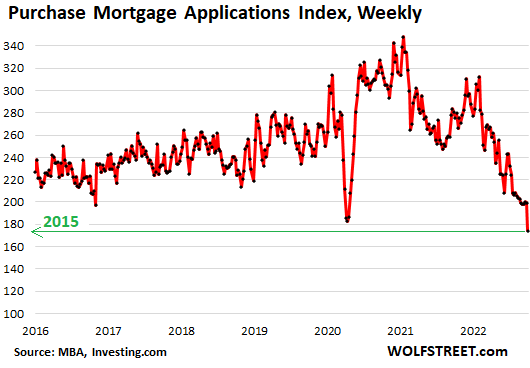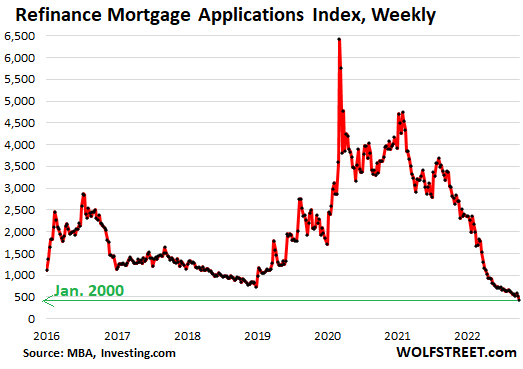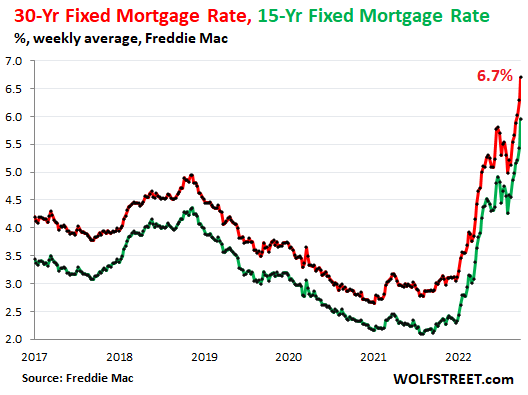by Wolf Richter, Wolf Street:
 But even these highest-since-2007 mortgage rates are still far below the highest-since-1981 inflation.
But even these highest-since-2007 mortgage rates are still far below the highest-since-1981 inflation.
In the week ended September 30, demand for mortgages to purchase a home plunged by 13%, seasonally adjusted, from the already beaten-down levels in the prior week, according to the Mortgage Bankers Association today. Compared to the same week last year, purchase mortgage applications dropped by 37%. They fell through the lows during the lockdowns and hit the lowest level since October 2015! Purchase mortgage applications are an indication of housing demand over the next few weeks.
TRUTH LIVES on at https://sgtreport.tv/
The weekly drop was in part caused by Hurricane Ian, and in part by the spike in mortgage rates into the 7% range:

Applications for mortgages to refinance an existing mortgage plunged by 18% compared to the prior week, seasonally adjusted, and by 86% from a year ago, to the lowest level since January 2000. No homeowners in their right minds are going to refinance an old 3% or 4% mortgage with a new 7% mortgage, except to extract emergency cash, which will cost them dearly, and they might be able to accomplish the same for a lot less with a HELOC. So the HELOC business, which has totally died down since the Financial Crisis, should perk up again.
The mortgage refi business is crucial for the mortgage lenders. The largest mortgage lenders in the US – Rocket Companies, which owns Quicken Loans, United Wholesale Mortgage, which owns United Shore Financial, and LoanDepot, all have cut staff by thousands of people each, and their stocks have crashed. The entire industry is trimming back to survive. Some mortgage lenders already filed for bankruptcy. Others have shut down (read: Mortgage Lender Woes)

The daily measure of the average 30-year-fixed mortgage rate by Mortgage News Daily hit 7.08% on Tuesday last week. It then dropped back, and today jumped again, hitting 6.95%.
Freddie Mac’s weekly measure, released today, based on mortgage rates early this week, jumped by 41 basis points from the prior week, to 6.7%, the highest since 2007 (red line in the chart below). A year ago, it was 3.0%.
Since mid-August, when the summer bear-market rally ended, the average 30-year fixed mortgage rate spiked by 171 basis points.
The average 15-year mortgage – if you can handle the payment at the current prices – spiked by 52 basis points from the prior week to 5.96% (green line), the highest since October 2008, according to Freddie Mac data.
But wait: even these much higher-than-last-year mortgage rates are still far below the rate of inflation, with CPI inflation over 8%. But mortgage rates are catching up.

The spread blows out.
The 30-year fixed mortgage rate runs roughly in parallel with the 10-year Treasury yield, but higher. This makes sense because most mortgages get paid off much sooner than in 30- years, as people refinance the mortgage or sell the home. The average lifespan of a 30-year mortgage is less than 10 years, according to Rocket Mortgage.



